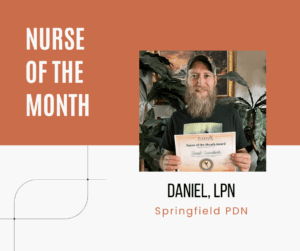A Self-Care Strategy for Patients Receiving Hospice Care at Home in Missouri and Kansas
When facing a life-limiting illness, it can be hard to find self-care strategies that help reduce physical and emotional stressors. You can rely on your hospice care providers for pain management and medication, but even then, it sometimes isn’t enough for symptom prevention.
However, there are additional solutions you can try. Some people find that a mindfulness practice can provide relief.
Family members of hospice patients, too, can also benefit from mindfulness in conjunction with the emotional and spiritual support hospice organizations provide.
How does one begin a mindfulness practice? And what does “mindfulness” mean, anyway? Keep reading to learn more about just how easy this meditation can be.
What Is Hospice Care?
Sometimes called comfort care, hospice services focus on ensuring the best possible quality of life for those facing a life-limiting terminal illness. Hospice care provides pain and symptom relief for patients, but also helps with spiritual and emotional needs of family members.
Many patients and their families prefer to receive hospice care at home, in lieu of moving to an unfamiliar facility. It is often more comfortable to receive hospice services in a setting you’re familiar with, surrounded by your loved ones and your own possessions.
What Is Mindfulness? What Is Meditation?
Mindfulness is a state of awareness of the present moment without judgment. It is accepting the here and now with acceptance and curiosity. Mindfulness is a form of meditation and is not aligned with any particular religion or spiritual belief.
More generally, meditation is simply a practice of focused concentration, whereas mindfulness hones in on sensations you’re feeling in the present moment.
How Can Hospice Care Patients Practice Mindfulness?
During a mindful meditation, focus completely on what you are doing – drinking coffee, taking in the outdoors, or simply resting peacefully on your sofa. Some mindfulness practitioners prefer to focus on their breathing in moments of solitude, which can help relieve stress and promote relaxation.
If you find your thoughts drifting, return your focus back to the activity you have chosen. Think only about the sensations you’re feeling as you perform the task. For example, you may focus on the flavor or temperature of your coffee, the feeling of the wind against your face, or how your sofa cushions feel on your body as you recline.
Guided mindfulness meditations can be helpful to direct your practice. These can come from your mental health counselor or even a meditation app or YouTube video.
How Can Mindfulness Complement In-Home Hospice Care?
The best hospice services in your area increase patients’ and their loved ones’ quality of life, and studies show that mindfulness can help support the achievement of this goal.
Not only can mindfulness help put the end-of-life into perspective, but it also has shown a reduction in chronic pain by 57% in patients who are new to the practice. Studies also show that mindfulness reduces pain even more in those who are more advanced in their meditation practice.
Mindfulness is also a wonderful practice for hospice patients’ family members who serve as primary caregivers. Because they can use mindfulness as a form of self care, they enjoy an improved sense of well-being and reduce their risk of burnout. Another method of reducing burnout is by scheduling private duty care services for your loved one.
Where Can I Learn More About Mindfulness?
To begin a mindfulness practice while you or a loved one receives hospice care, explore these carefully vetted resources that you may find helpful.
- Mindfulness.org’s “How to Meditate”
- “Meditation for Caregivers” from the Family Caregivers Council blog
- “A Guided Meditation for Hospice & Palliative Care” on Audible.com
- A variety of guided meditations from the Stanford Health Library, including those for help with pain, hospice care, and palliative care
- Freemindfulness.org’s library of free resources, including guided mindfulness meditations
Where Can I Find the Best In-Home Hospice Care in My Area?
When it’s time to transition to hospice care, you want to ensure you’re receiving only the best services available to you.
To help you find reputable hospice services near you, be sure to:
- Look at online reviews and patient testimonials, such as those on HealthGrades or Google Reviews.
- Ask your physician or your assigned hospital social worker for their recommendations.
- Ask family members or colleagues if they are familiar with any hospice care agencies in the area.
- Call hospice services in your area to find the best fit for you and your loved one. Be sure to ask them how they support emotional and spiritual needs in addition to physical or medical ones.






